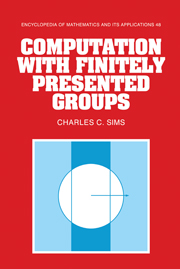
-
Select format
-
- Publisher:
- Cambridge University Press
- Publication date:
- March 2010
- January 1994
- ISBN:
- 9780511574702
- 9780521432139
- 9780521135078
- Dimensions:
- (234 x 156 mm)
- Weight & Pages:
- 0.975kg, 624 Pages
- Dimensions:
- (234 x 156 mm)
- Weight & Pages:
- 0.86kg, 624 Pages
- Subjects:
- Mathematics (general), Mathematics, Algebra
- Series:
- Encyclopedia of Mathematics and its Applications (48)
You may already have access via personal or institutional login- Subjects:
- Mathematics (general), Mathematics, Algebra
- Series:
- Encyclopedia of Mathematics and its Applications (48)
Book description
Research in computational group theory, an active subfield of computational algebra, has emphasised three areas: finite permutation groups, finite solvable groups, and finitely presented groups. This book deals with the third of these areas. The author emphasises the connections with fundamental algorithms from theoretical computer science, particularly the theory of automata and formal languages, computational number theory, and computational commutative algebra. The LLL lattice reduction algorithm and various algorithms for Hermite and Smith normal forms from computational number theory are used to study the abelian quotients of a finitely presented group. The work of Baumslag, Cannonito and Miller on computing nonabelian polycyclic quotients is described as a generalisation of Buchberger's Gröbner basis methods to right ideals in the integral group ring of a polycyclic group. Researchers in computational group theory, mathematicians interested in finitely presented groups and theoretical computer scientists will find this book useful.
Reviews
"this book is a very interesting treatment of the computational aspects of combinatorial group theory. It is well-written, nicely illustrating the algorithms presented with many examples. Also, some remarks on the history of the field are included. In adition, many exercises are provided throughout...this is a very valuable book that is well-suited as a textbook for a graduate course on computational group theory. It addresses students of mahtematics and of computer science alike, providing the necessary background for both. In addition, this book will be of good use as a reference source for computational aspects of combinatorial group theory." Friedrich Otto, Mathematical Reviews
Contents
Metrics
Altmetric attention score
Full text views
Full text views help Loading metrics...
Loading metrics...
* Views captured on Cambridge Core between #date#. This data will be updated every 24 hours.
Usage data cannot currently be displayed.
Accessibility standard: Unknown
Why this information is here
This section outlines the accessibility features of this content - including support for screen readers, full keyboard navigation and high-contrast display options. This may not be relevant for you.
Accessibility Information
Accessibility compliance for the PDF of this book is currently unknown and may be updated in the future.


